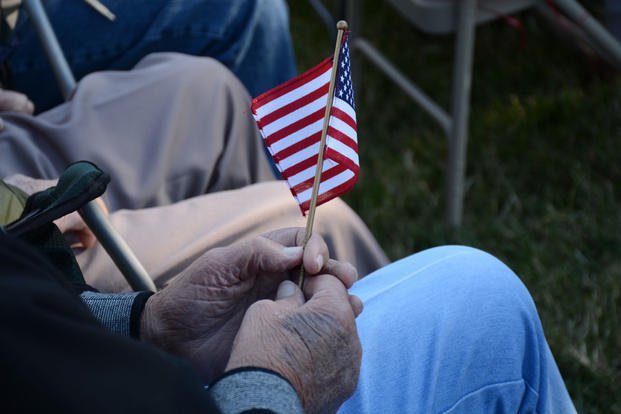Megan Powell is a Dole Caregiver Fellow with the Elizabeth Dole Foundation and a caregiver to her husband, a combat veteran and retired Army officer.
The opinions expressed in this op-ed are those of the author and do not necessarily reflect the views of Military.com. If you would like to submit your own commentary, please send your article to opinions@military.com for consideration.
The pandemic has been an extended education about how to protect ourselves against contagious diseases. The three years I have spent caring for my husband have taught me that some health challenges can sneak through the masks, gloves and incessant hand washing.
Like so many military caregivers, I have experienced the spread of emotional stress, anxiety and depression that often come with supporting a loved one. Fortunately, over time, my husband and I have figured out ways to suppress the contagion.
Caring for a service member or veteran can be extraordinarily difficult. It tests a caregiver's patience, emotions and capacity to handle stress. A Rand Corp. study commissioned by the Elizabeth Dole Foundation found elevated emotional distress across all generations of military caregivers, with those supporting veterans of the post-9/11 wars reporting distress at four times the rate of their civilian peers.
Experiencing mental health issues as a caregiver is particularly hard when your care recipient also struggles with mental health, which is common. About 42% of military caregivers support someone with mental health or substance abuse challenges. Additionally, 12% of military caregivers assist a service member or veteran with a traumatic brain injury, which can cause symptoms like mood fluctuations and depression.
I am among those caregivers who care for a veteran with both a TBI, or traumatic brain injury, and PTSD, or post-traumatic stress disorder. My husband Jesse deployed to Afghanistan four times with the Army. Each was difficult, though the last would be the one that upended our lives.
During his final time in Afghanistan, he was troop commander on an "advise and assist" mission providing VIP security. His unit sustained an attack by an Afghan soldier. One of Jesse's soldiers was killed in action in front of him, and eight were injured. Four years after Jesse returned home, he realized that the depression, anxiety and irritability he was feeling were signs of PTSD and asked for help. During his treatment, it was discovered he also had a TBI. These conditions challenged his ability to live independently. Suddenly, I was not only his wife, but his caregiver.
For some, the experience of caregiving is the cause of emotional distress. Other caregivers sustain a very specific type of mental health challenge, commonly called "Secondary PTSD," which is when the caregiver begins to share in their veteran's anxieties and react to the same triggers. For me, I have experienced anxiety for most of my life, though the responsibilities of caregiving certainly make it worse some days.
Too many caregivers and care recipients fall into a constant loop of triggering one another's emotions. Often, my anxiety can activate my husband's, almost as if it is contagious. I have seen the dynamic strain families, break up marriages, and undermine a caregiver's ability to support their service member or veteran.
Earlier this year, I was selected as a Dole Caregiver Fellow with the Elizabeth Dole Foundation. One of my goals is to help military caregivers navigate life with invisible wounds faster than my husband and I did. Here are a couple of key tips that I have learned through my own difficult experiences:
Help your veteran find a mental health professional.
Caregivers get into trouble trying to handle their veteran's emotional weight. We are not trained to manage it, nor is it our job as a spouse or caregiver. Your care recipient needs a professional whom they are comfortable talking to. You, as the caregiver, have a place in the process, but it is not to shoulder their burdens. Jesse and I have developed an understanding of what problems and emotions we can help each other with and which need to be saved for the therapist. Jesse's therapist also helps us determine when he is struggling with his PTSD or TBI, or when he is dealing with the normal stresses of life. Knowing the difference is a big help in determining how I respond.
Find YOURSELF a mental health professional.
Whether you consult the same therapist as your veteran, or you find one of your own, you need an outlet too! As a caregiver, I don't get to have a bad day because those can spread to my husband. I have to be there for him and often step up as the primary parent too. Having a regular therapy appointment gives me time and space to work on myself.
Don't be afraid of support groups.
Support groups are not all about sharing emotions and heavy conversations. They are places where you are free to be open and honest. During this caregiving journey, you need the support of others who understand what you are going through. A good group will also be a source of practical advice from peers and a space where you can laugh at the hard stuff that only caregivers understand. HiddenHeroes.org offers its own support group and can direct you to other mental health resources.
Enlist a friend to listen to you vent.
Even with a therapist, it is helpful to have that friend who will let you pour out your emotions or just complain, with no judgment or criticism. Sometimes, that is exactly what you need to get through the moment. A good friend will also set you straight when you have lost perspective, which happens to the best caregivers.














